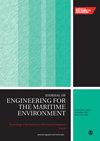为船体组装优化高效、精确的对接轨迹
IF 1.5
4区 工程技术
Q3 ENGINEERING, MARINE
Proceedings of the Institution of Mechanical Engineers, Part M: Journal of Engineering for the Maritime Environment
Pub Date : 2023-11-29
DOI:10.1177/14750902231210344
引用次数: 0
摘要
船体组装是造船过程中极为重要的一个阶段。然而,目前人工装配效率低,精度差,极易发生碰撞。因此,船体自动对接技术研究迫在眉睫。自动对接技术的核心是姿态估计和姿态设备的轨迹规划。然而,目前的数据测量和点集匹配方法导致姿态估计误差较大,难以满足装配精度要求。此外,目前的船体轨迹规划方法更注重单一指标,如时间或能耗,而忽略了冲击度。针对上述问题,本研究首先提出了一种高精度的测量点集匹配方法,以估算船体的精确姿态。随后,利用七度多项式对船体进行轨迹平移。在此基础上,提出了一种非线性加权改进粒子群优化(IPSO)方法,以优化船体轨迹规划过程中的时间、能耗和冲击度。最后,通过仿真分析验证了匹配优化的准确性,并得出结论:与其他多项式相比,七度多项式导致的冲击更小。此外,即使船体分步摆动,冲击力也不会突然变化。通过 IPSO,船体平移过程中的能耗和冲击度性能指标分别优化了 37.07% 和 50.06%。本文章由计算机程序翻译,如有差异,请以英文原文为准。
Efficient and precise docking trajectory optimization for the ship block assembly
The assembly of the ship block is an extremely important stage of the shipbuilding process. Nevertheless, currently, the manual assembly efficiency is low, the accuracy is poor, and collision is very easy to occur. Therefore, there is an urgent need to conduct technical research on the automatic docking of ship blocks. The core of the automated docking technology is the attitude estimation and the trajectory planning of the posturing equipment. However, current data measurement and point set matching methods lead to large attitude-estimation errors, and it is difficult to meet the accuracy requirements of the assembly. Moreover, the current ship block trajectory planning methods pay more attention to single metrics, for example, time or energy consumption, while omitting the shock degree. In response to the above, this study first proposes a high-precision matching method for measuring point sets, in order to estimate the exact attitude of the ship block. Subsequently, trajectory translation for the block is performed using the seventh-degree polynomial. On this basis, a nonlinear weighted improved particle swarm optimization (IPSO) method is proposed to optimize the time, energy consumption and shock degree in the ship block trajectory planning process. Finally, the accuracy of the matching optimization is validated by simulation analysis and it is concluded that the seventh-degree polynomial leads to less shock than other polynomials. Furthermore, the shock force does not change abruptly even when the ship block is poised in steps. Through IPSO, the energy consumption and shock degree performance indices are optimized by 37.07% and 50.06%, respectively, in the ship block translation process.
求助全文
通过发布文献求助,成功后即可免费获取论文全文。
去求助
来源期刊

CiteScore
3.90
自引率
11.10%
发文量
77
审稿时长
>12 weeks
期刊介绍:
The Journal of Engineering for the Maritime Environment is concerned with the design, production and operation of engineering artefacts for the maritime environment. The journal straddles the traditional boundaries of naval architecture, marine engineering, offshore/ocean engineering, coastal engineering and port engineering.
 求助内容:
求助内容: 应助结果提醒方式:
应助结果提醒方式:


